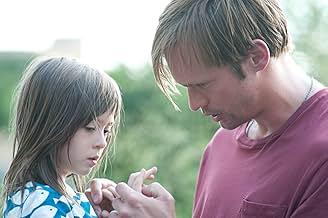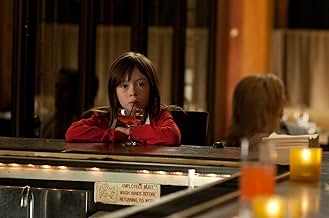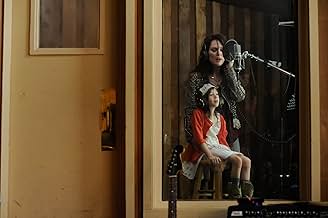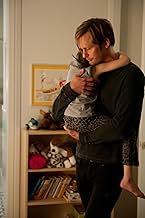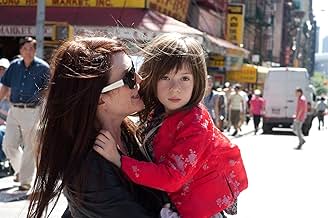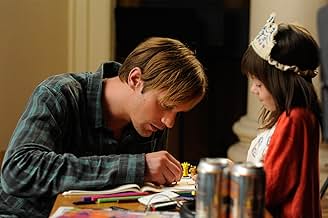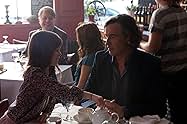AVALIAÇÃO DA IMDb
7,4/10
29 mil
SUA AVALIAÇÃO
Na cidade de Nova York, uma jovem fica no meio da desagradável batalha por custódia de seus pais.Na cidade de Nova York, uma jovem fica no meio da desagradável batalha por custódia de seus pais.Na cidade de Nova York, uma jovem fica no meio da desagradável batalha por custódia de seus pais.
- Direção
- Roteiristas
- Artistas
- Prêmios
- 3 vitórias e 8 indicações no total
Jesse Stone Spadaccini
- Martin
- (as Jesse Spadaccini)
Diana García
- Cecelia
- (as Diana Garcia Soto)
- Direção
- Roteiristas
- Elenco e equipe completos
- Produção, bilheteria e muito mais no IMDbPro
Avaliações em destaque
10isachs
A gorgeous film that manages to convey the emotion of childhood at its more heart-wrenching. The central performance by Joanna Vanderham is absolutely extraordinary, and reminds me of some of the greatest child performances I've ever seen on film. As her parents, Julianne Moore and Steve Coogan make you feel like you are right in the middle of the tumult of family life. Directors Scott McGehee and David Siegel have created a movie that feels like life, the vulnerability, the abruptness, the comedy, the joy.
With intimacy at times almost startling, this is one of the best adaptations of a novel by Henry James I've ever seen.
With intimacy at times almost startling, this is one of the best adaptations of a novel by Henry James I've ever seen.
10kcfl-1
This is what I hope Henry James would have written, were he alive today. The book is tough sledding, late James when he was dictating his novels (due to tendinitis), and there was no holding him back. At least one Harvard professor called him "the greatest American novelist," but this work is deservedly minor.
The movie was perfect, in the top 1% of all I've seen. The style was the antithesis of James, radical "showing" instead of "telling."
I think the title should have been "What Maisie SAW," but that's too titillating. What she knew or felt only her future therapist will learn. We do have a hint though when her father throws her mother's flowers away, and M explains, "He was allergic."
The movie was perfect, in the top 1% of all I've seen. The style was the antithesis of James, radical "showing" instead of "telling."
I think the title should have been "What Maisie SAW," but that's too titillating. What she knew or felt only her future therapist will learn. We do have a hint though when her father throws her mother's flowers away, and M explains, "He was allergic."
It always amazes me when I see a really impressive child acting performance. This is one of an impressive collective of films where a young performer has been quite outstanding. But there is something of an important difference between this one and most others. While the likes of Tatum O'Neal (Paper Moon), Ivana Baquero (Pan's Labyrinth) or Haley Joel Osment (The Sixth Sense) were all brilliant, none of them were as young as Onata Aprile. When you consider that at her age she simply will be incapable of understanding all the nuances of the screenplay, it makes it all the more outstanding just how good she is. She doesn't really say a whole lot but her looks convey massive amounts of meaning. Her performance is so natural that it reminds me of kid's drawings – so unaffected, unpretentious and instinctive that adults can never faithfully replicate them. The acting by the entire cast here is top calibre but at times like this you cannot compete and Onata Aprile easily steals the show.
It's quite a disturbing story really. Maisie is a neglected child and it's not very pleasant seeing her be passed around from pillar to post being essentially disregarded. The view the film adopts is a child's one. We see Maisie peeking round corners, in the periphery watching, seeing but never fully comprehending but understanding more than she is given credit for. She seems to know more about right and wrong than her parents do, for example. They are in worlds of their own, ignoring their little girl in order to play out their own self-obsessed games. Steve Coogan and Julianne Moore are very good in these unsympathetic roles in which they make you understand why they are like the way they are without making us actually sympathise with them.
The film works so well because it's given such an unsentimental treatment. The story unfolds subtly and believably and it avoids saccharine. While Maisie's parents are the bad guys of the piece they're not really villains as such, just extremely poor parents and very selfish people generally. As it turns out, it's the parent's new partners who are left increasingly in charge of the little girl and they are slowly drawn towards each other too. Collectively they make for an actual workable and loving family unit. Both Alexander Skarsgård and Joanna Vanderham are also great as these much more sympathetic adults. Events ultimately progress to an ending that was upbeat without sacrificing believability; it's simultaneously inconclusive yet hopeful. I suppose one of the messages of What Maisie Knew is that what is important is what is best for the child, not what is convenient for blood parents.
It's quite a disturbing story really. Maisie is a neglected child and it's not very pleasant seeing her be passed around from pillar to post being essentially disregarded. The view the film adopts is a child's one. We see Maisie peeking round corners, in the periphery watching, seeing but never fully comprehending but understanding more than she is given credit for. She seems to know more about right and wrong than her parents do, for example. They are in worlds of their own, ignoring their little girl in order to play out their own self-obsessed games. Steve Coogan and Julianne Moore are very good in these unsympathetic roles in which they make you understand why they are like the way they are without making us actually sympathise with them.
The film works so well because it's given such an unsentimental treatment. The story unfolds subtly and believably and it avoids saccharine. While Maisie's parents are the bad guys of the piece they're not really villains as such, just extremely poor parents and very selfish people generally. As it turns out, it's the parent's new partners who are left increasingly in charge of the little girl and they are slowly drawn towards each other too. Collectively they make for an actual workable and loving family unit. Both Alexander Skarsgård and Joanna Vanderham are also great as these much more sympathetic adults. Events ultimately progress to an ending that was upbeat without sacrificing believability; it's simultaneously inconclusive yet hopeful. I suppose one of the messages of What Maisie Knew is that what is important is what is best for the child, not what is convenient for blood parents.
Greetings again from the darkness. An ultra-modern update of the 1897 Henry James novel introduces us to parents we know, but wish we didn't. Steve Coogan plays Beale, a self-absorbed art dealer. Julianne Moore plays Susanna, a self-absorbed rock star. OK, you and I may not know art dealers and rock stars, but we know self-absorbed types and we know they make terrible parents. So not only do we know it, but it's also what Maisie knows.
Five outstanding performances and strong work by co-directors Scott McGhee and David Siegel prevent this one from spinning off into the neverlands of melodramatic muck. Onata Aprile is a wonder as Maisie. She displays none of the typical "movie kid" precociousness. The movie (and James novel) are told from her point of view. We see the fragmented bits and pieces she experiences as her parents fight. Rather than a full story, we share her moments of late pick-ups, early drop-offs and forgotten trips.
Soon enough Beale and Susanna are divorced and the real wars begin. These despicable adults make little effort in hiding their hatred of each other from 6 year old Maisie. It becomes background noise to her life. Further proof of the epic narcissism from both, Beale soon marries Margot the nanny (played by Joanna Vanderham) and Susanna reacts by marrying Lincoln, a band gopher and bartender played by studly Alexander Skarsgard. The most startling moment of the movie occurs when Lincoln first begins playing with Maisie ... it's as if we had almost forgotten what it means to give your attention to a child.
This is not an easy film to watch ... at least if you understand that parenting means putting yourself second. The directors do a wonderful job of showing us how Maisie takes in moments and what memories she makes from these. The neglect and false moments of caring from her parents make her acceptance of the attention to her step-parents even more poignant. We can't help but hope things work out for this little girl and it's a reminder that childhood innocence cannot be recaptured once lost ... and it's worth hanging on to for as long as possible.
Five outstanding performances and strong work by co-directors Scott McGhee and David Siegel prevent this one from spinning off into the neverlands of melodramatic muck. Onata Aprile is a wonder as Maisie. She displays none of the typical "movie kid" precociousness. The movie (and James novel) are told from her point of view. We see the fragmented bits and pieces she experiences as her parents fight. Rather than a full story, we share her moments of late pick-ups, early drop-offs and forgotten trips.
Soon enough Beale and Susanna are divorced and the real wars begin. These despicable adults make little effort in hiding their hatred of each other from 6 year old Maisie. It becomes background noise to her life. Further proof of the epic narcissism from both, Beale soon marries Margot the nanny (played by Joanna Vanderham) and Susanna reacts by marrying Lincoln, a band gopher and bartender played by studly Alexander Skarsgard. The most startling moment of the movie occurs when Lincoln first begins playing with Maisie ... it's as if we had almost forgotten what it means to give your attention to a child.
This is not an easy film to watch ... at least if you understand that parenting means putting yourself second. The directors do a wonderful job of showing us how Maisie takes in moments and what memories she makes from these. The neglect and false moments of caring from her parents make her acceptance of the attention to her step-parents even more poignant. We can't help but hope things work out for this little girl and it's a reminder that childhood innocence cannot be recaptured once lost ... and it's worth hanging on to for as long as possible.
I've read five previously posted reviews of this film and see no reason to repeat what they've already said. I agree, for the most part, with the positive ones. And I suspect the negative ones were written by people whose established taste in movies should have steered them away from seeing this one in the first place.
What I'll add is, I guess, a mostly personal perspective. I've found that I am lately much more drawn to smaller, more deeply felt movies than to bigger, slicker, higher-production-value ones. To "What Maisie Knew," for example, than to "The Great Gatsby." Even though both source novels share a similar interior aesthetic, the treatment in the former stays inside the characters, where James focused the original (thus causing one of the previous reviewers' comments to the effect that "nothing happens" in the movie), while the latter (possibly because of Luhrmann's well-established directorial predilections)stays resolutely focused on the exterior spectacle and barely skims the surface of Fitzgerald's deeply rendered characterizations.
If you like smaller, more closely observed and deeply felt films, you'll like this one.
What I'll add is, I guess, a mostly personal perspective. I've found that I am lately much more drawn to smaller, more deeply felt movies than to bigger, slicker, higher-production-value ones. To "What Maisie Knew," for example, than to "The Great Gatsby." Even though both source novels share a similar interior aesthetic, the treatment in the former stays inside the characters, where James focused the original (thus causing one of the previous reviewers' comments to the effect that "nothing happens" in the movie), while the latter (possibly because of Luhrmann's well-established directorial predilections)stays resolutely focused on the exterior spectacle and barely skims the surface of Fitzgerald's deeply rendered characterizations.
If you like smaller, more closely observed and deeply felt films, you'll like this one.
Você sabia?
- CuriosidadesIn an interview on the NPR program "Fresh Air", Julianne Moore said that she drew on Courtney Love and Patti Smith for inspiration for her character in this movie, who is (like Love and Smith) a rock star who is also a mother.
- ConexõesFeatured in At the Movies: Episode #10.26 (2013)
- Trilhas sonorasRockabye Baby
Performed by Julianne Moore
Principais escolhas
Faça login para avaliar e ver a lista de recomendações personalizadas
- How long is What Maisie Knew?Fornecido pela Alexa
Detalhes
- Data de lançamento
- País de origem
- Centrais de atendimento oficiais
- Idioma
- Também conhecido como
- What Maisie Knew
- Locações de filme
- The High Line, Manhattan, Nova Iorque, Nova Iorque, EUA(Maisie and Lincoln play at the High Line)
- Empresas de produção
- Consulte mais créditos da empresa na IMDbPro
Bilheteria
- Orçamento
- US$ 6.000.000 (estimativa)
- Faturamento bruto nos EUA e Canadá
- US$ 1.066.471
- Fim de semana de estreia nos EUA e Canadá
- US$ 21.480
- 5 de mai. de 2013
- Faturamento bruto mundial
- US$ 2.711.379
- Tempo de duração1 hora 39 minutos
- Cor
- Mixagem de som
- Proporção
- 2.35 : 1
Contribua para esta página
Sugerir uma alteração ou adicionar conteúdo ausente

Principal brecha
By what name was Pelos Olhos de Maisie (2012) officially released in India in English?
Responda






